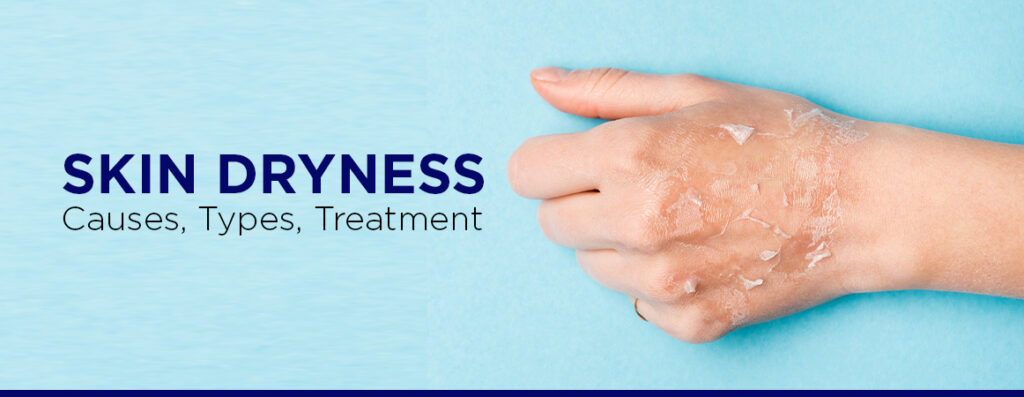Skin Dryness: Causes, Types, Treatment
Causes of Skin Dryness
Skin dryness happens when the skin loses its moisture or is unable to retain sufficient hydration. Some of the factors are:
1. Environmental Factors
Exposure to cold, dry weather is a common cause of skin dryness, especially during winter months. Low humidity levels and central heating systems strip the skin of its natural oils, leading to dryness and irritation. Overexposure to the sun and pollution can also exacerbate the condition.
2. Harsh Skincare Products
Using soaps, cleansers, or exfoliators that contain alcohol or strong chemicals can remove the skin’s natural oils, resulting in dryness. Excessive use of scrubs, particularly on sensitive areas like the face, can further aggravate skin dryness.
3. Medical Conditions
Certain medical conditions such as eczema, psoriasis, and hypothyroidism can lead to severe skin dryness. These circumstances impair the skin’s ability to act as a barrier, increasing its vulnerability to moisture loss. In some cases, dryness and hyperpigmentation may also appear, making the skin uneven in tone and texture.
4. Aging
As people age, their skin produces less natural oil (sebum), which can result in skin dryness. This lack of hydration can cause fine lines, wrinkles, and rough patches, especially on the face.
5. Skin Dryness in Pregnancy
Hormonal changes during pregnancy can lead to skin dryness. Pregnant women often experience dryness on their face and body as their skin adjusts to fluctuating hormone levels. Additionally, the stretching of the skin during pregnancy can make it more prone to dryness, itching, and irritation.
Types of Skin Dryness
Skin dryness can manifest differently depending on the individual and the underlying cause. Below are some common types:
1. Dry Skin on the Face
The skin on the face is more delicate than other areas, making it especially vulnerable to dryness. Dry patches may appear on the forehead, cheeks, or around the mouth, often accompanied by flakiness or redness. This type of dryness is frequently caused by harsh skincare products or environmental factors like wind and sun exposure.
2. Dry, Itchy Skin on the Body
Dryness on the body, particularly on the legs, arms, and hands, is common during cold weather. This type of dryness is often accompanied by itching and rough, flaky patches. In some cases, itching can become severe enough to cause scratching and lead to skin injuries.
3. Dryness and Hyperpigmentation of the Skin
When the skin becomes dry, it can lead to inflammation, which in turn can cause post-inflammatory hyperpigmentation. This means that darker spots may appear on dry, irritated areas of the skin. People with darker skin tones are more likely to get hyperpigmentation, which is more obvious on the hands and face.
Treatment of Dryness of Skin
Managing skin dryness requires consistent care and attention to lifestyle habits. Below are some of the most effective treatments for dryness of skin:
1. Moisturize Regularly
Moisturizing is key to treating skin dryness. Opt for thick, oil-based moisturizers or creams that contain hydrating ingredients like glycerin, hyaluronic acid, and ceramides. For skin dryness on the face, choose products formulated for sensitive skin to avoid irritation.
2. Use Gentle Cleansers
Switch to mild, soap-free cleansers that won’t strip the skin of its natural oils. Avoid cleansers with alcohol or fragrances, as they can aggravate dryness. For skin dryness in pregnancy, look for products labeled as pregnancy-safe to avoid any harmful chemicals.
3. Humidify Your Environment
Using a humidifier indoors can add moisture to the air, especially during winter when the air tends to be drier. This can help prevent further loss of moisture from the skin.
4. Avoid Hot Showers
Long, hot showers can remove natural oils from the skin. Use lukewarm water instead for bathing. Use a moisturizer as soon as you get out of the shower to seal in the moisture in your skin.
5. Protect Your Skin from the Sun
Sun exposure can worsen skin dryness and lead to hyperpigmentation. Always use a broad-spectrum sunscreen with at least SPF 30, even on cloudy days, to protect the skin from harmful UV rays.
Conclusion
Whether you’re dealing with skin dryness on the face or experiencing skin dryness in pregnancy, understanding the causes and available treatments is crucial for maintaining healthy, hydrated skin. Consistent moisturizing, using gentle skincare products, and avoiding environmental triggers are key strategies in the treatment of dryness of skin.
Post Disclaimer
The information contained in this post is for general information purposes only. The information is provided by "Skin Dryness: Causes, Types, Treatment "and while we endeavour to keep the information up to date.
Legal Disclaimer
We do not claim to cure any disease which is considered’ incurable ‘ on the basis of scientific facts by modern medicine .The website’s content is not a substitute for direct, personal, professional medical care and diagnosis. None of the medicines mentioned in the posts ,including services mentioned at "medicineguide.us" should be used without clearance from your physician or health care provider.
Testimonials Disclaimer– : Results may vary, and testimonials are not claimed to represent typical results. The testimonials are real, and these patients have been treated with homeopathy treatment from our clinic . However, these results are meant as a showcase of what the best, Medicine can do with their disease contions and should not be taken as average or typical results.


